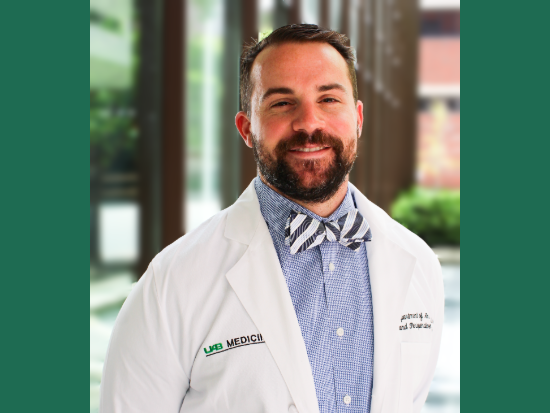 John Briggs, M.D., MSHA, shares how his time in the Air Force instilled a perspective of purposefulness that cascades into his work as an anesthesiologist.
John Briggs, M.D., MSHA, shares how his time in the Air Force instilled a perspective of purposefulness that cascades into his work as an anesthesiologist.
Life in the military
Inspired by the heroism of his veteran father, Dr. Briggs, associate professor in the UAB Heersink School of Medicine Department of Anesthesiology and Perioperative Medicine, entered the Air Force wanting to be part of something bigger than himself. Inspired by the heroism of his father, who served in the Air Force during Operation Desert Storm, Briggs was exposed to the principles of duty and service throughout his life. These values were reinforced when he enlisted in the Air Force, a journey that would shape his professional and personal philosophies.
Following his residency training, Briggs went on to lead unit at their Mississippi bases and was later deployed to Saudi Arabia to lead a ground surgical team. During this time in Saudi Arabia, Briggs honed his senses of resiliency and adaptability, skills that he now passes on to trainees.
“There is a sense of purpose,” Briggs says. “Nobody gets to pick their anesthesiologist in the operating room. They just have to trust us, and there is so much trust there. I think we need, we can, and we should do a better job of teaching that.”
Leading with purpose
Upon transitioning to civilian life, Briggs observed a difference in the unified mission that was so easily acknowledged in the military. Wanting to emphasize a clear sense of purpose in his work, he inspires young physicians to look at the big picture of medicine: helping others.
“It’s about taking care of each other and taking care of the people that need you,” he says.
Briggs believes that physician burnout is the result of a misalignment of priorities and focusing too much on aspects other than the core purpose of patient care. He advocates for teaching trainees to approach problems in innovative ways, reconnect with the emotional aspects of patient care, and find meaning in their work. “Providing another lens to view what you’re doing is important,” he emphasizes.
In his role as an anesthesiologist, Briggs leads by example. He creates an environment conducive to learning and growth, where successes are shared, and failures reflect on his guidance.
“I think we, as attendings, have to teach by example,” he says. “I tell trainees, nurse practitioners, physician assistants, and CRNAs that my job is to make the opportunity in the environment such that when they succeed, it reflects well on them. When they fail, it reflects poorly on me. And that was my same leadership type in the military. I don’t expect anyone to do anything I can’t do, haven’t done, or wouldn’t do.”
Through his experiences, Briggs has developed a strong belief in purposeful practice. He teaches his residents not only the technical aspects of medicine, but also the importance of connecting with patients and colleagues on a human level.
“It’s easy to get caught up in the day-to-day. It is easy to disconnect yourself, emotionally, from the people in front of you. It’s important to not become overwhelmed. But by connecting to those people around you, you not only take great care of the patient but everyone else on the team as well,” he advises.